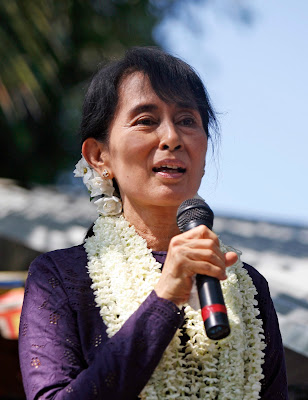June 24, 2012
 |
| Aung San Suu Kyi gives speech to supporters at Hlaing Thar Yar Township, Yangon, Myanmar on 17 November 2011. Photo: Htoo Tay Zar |
Aung San Suu Kyi, Nobel Peace Prize Laureate and once one of the most famous political prisoners in modern history, is now traveling the world on behalf of the government and people of her native Burma (Myanmar). She had been under house arrest for 15 of the last 21 years. Now her political party, called the National League for Democracy, is part of the Myanmar government and recently won 41 of the 43 vacant seats in the lower house of the Myanmar parliament. The military backed party still controls most of parliament, but her election and the inclusion of the NLD in government signals changes to come. Until now, Burma has been an isolated pariah state controlled by powerful military leaders. Those leaders are now claiming they wish to bring democracy to their country and the world is listening.
I expected that the visit of U.S. Secretary of State Hillary Clinton to Myanmar at the beginning of December, 2011 would bring about dramatic change – and it has. Aung San Suu Kyi’s inclusion in Burma’s government and her second foreign trip abroad in many years (the first was a recent trip to Thailand) will do more to open up Burma than anything else one could dream of.
The nations of the Western world are lining up to roll out the red carpet for Suu Kyi. On June 21 she addressed the British Parliament at Westminster Hall; the first non–head of state ever to do so. She is asking the world to help Burma and the world is eagerly agreeing, not least of all because Burma is rich in natural resources that both developed and developing nations lust for. Since March of this year, Burma has signed nine oil and gas exploration deals with foreign concerns from Hong Kong, Switzerland, Malaysia, India, Thailand, Indonesia and Russia. These companies will explore for oil and natural gas inland and offshore. The reserves are expected to be large and easy to extract. The United States, South Korea and Japan have all signed memorandums with the Burmese government to build hydro-electric dams on the country’s mighty rivers, the Irawaddy and the Salween. China is presently trying to build a hydro-electric generating dam on the Meka and Melika Rivers in Kachinland which is being opposed by the Kachin Independence Army, one of the largest insurgent armies in Burma.
Oil and natural gas are not the only riches of Burma. The country is famous for its rubies and sapphires and the rivers run rich in gold and platinum. Almost all of so-called Chinese Jade comes from the Kachin State of Burma. China is very interested in Burma because of its rich resources in Rare Earth Minerals needed for the instruments of modern technology and hydro-electric power to feed the exploding economy of Southern China. Everyone is lining up to get a piece of the action.
What does this mean for the Work of God in Burma?
The billions of dollars of foreign investment will mean increased opportunity for the growing number of church members in Burma. It will mean jobs and opportunities for higher education. It will mean roads and electricity going into remote areas. It will mean a loosening of restrictions on foreigners traveling into remote border areas. It will mean increased communications and travel to and from the outside world. Most importantly, it will mean that the government must settle its conflicts with numerous ethnic minorities that have been fighting a protracted war with the Burmese government for over 50 years. This freeing up of draconian restrictions and an exploding economy will increase opportunities to preach the Gospel of the Kingdom of God.
Great change is in the wind. Pray for more workers in the harvest fields. It is important that we train young men and women from COG congregations in Burma to return home and help lead their people in obedience to God’s Way of Life. We have three new students arriving this week in Thailand from Rangoon to begin classes at Legacy Institute Leadership Training Center.
Writing from Bangkok, Thailand,
Leon Sexton
View on Blogger: Winds of Change in Burma?

